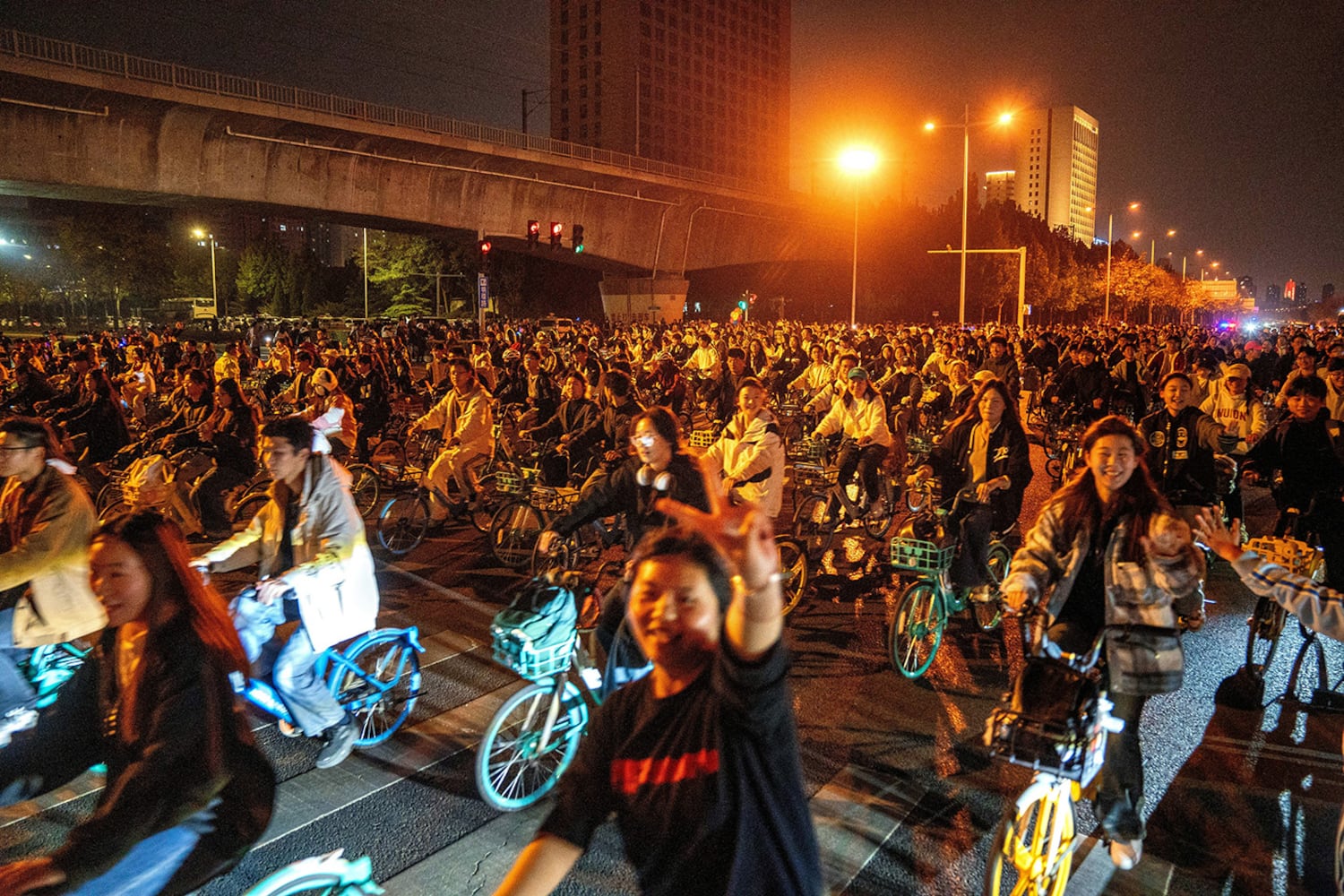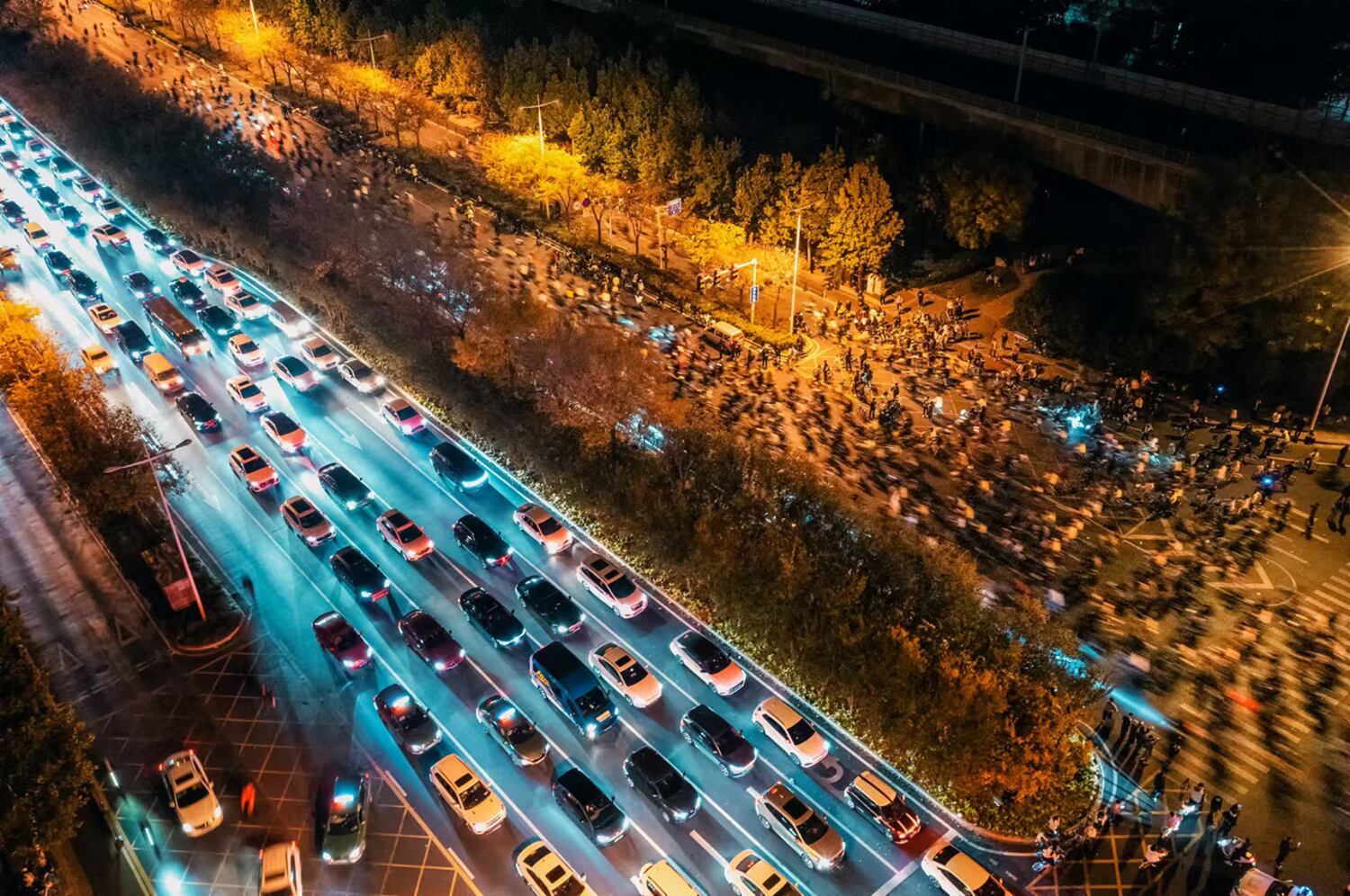China bans students from mass cycle rides at night
A college adventure to eat dumplings goes viral, in what could be a new form of public defiance by young people.

Authorities across China are cracking down on thousands of college students who took part in mass night-cycling events that commentators said could be seen as a new form of protest against the ruling Chinese Communist Party.
The police department in Henan’s Zhengzhou city issued a warning to students on Nov. 9, following a mass “night ride to Kaifeng” by thousands of young people a day earlier, as a social media video about riding to the city in search of dumplings spawned dozens of copycat outings, eventually expanding to a mass cycle ride that some observers said left the authorities rattled, concerned that it could turn into a political protest like the “white paper” movement two years ago, or Halloween in Shanghai.
Video footage of the rides uploaded to social media of the Nov. 8 event showed phalanxes of cyclists riding abreast across several lanes of a highway, flying the Chinese national flag and singing the Chinese national anthem, many of whom were riding bikes from urban sharing schemes.

Police didn’t take action at the time, but they announced a ban on cycles from downtown Zhengzhou on Nov. 9 and Nov. 10, reserving main roads for motorized traffic only, according to Jimu News.
Cycle-hire companies Hello, Qingjue and Meituan responded by banning the riding of their bikes between city jurisdictions, saying anyone who defied the ban would have their hired bike locked remotely.
A retired teacher from Zhengzhou who gave only the surname Jia for fear of reprisals said she saw the road from Zhengzhou to Kaifeng “packed” with cyclists on Nov. 8.
“I would say there were more than 200,000 people,” Jia said. “Zhengzhou to Kaifeng Boulevard was so crowded that ... there were no shared bikes left and a lot of people had to walk instead.”
“[The authorities] are very nervous,” she said.
The cycling bans came after the Nov. 8 ride was joined by more than 600 students who traveled down by train from Beijing to take part, and also by military veterans, a group regarded as highly politically sensitive by the government, who carried flags and shouted slogans calling for “freedom,” according to social media reports.
“Eight years in the Rocket Force, night ride to Kaifeng -- charge!” a person shouts in one video clip. “Five years in the Air Force, retired but still got it, night ride to Kaifeng, let’s go!” shouts someone else.
One Douyin user from Shandong posted a video saying the authorities in Henan were now cracking down on “night rides” by students in universities across the province, as well as in the northern provinces of Shanxi and Shaanxi.
“One video I saw showed students from Shandong and Tianjin also took action, with some waving national flags,” the user said.
According to other social media posts, some students who tried to form a mass ride to Beijing’s Tiananmen Square were stopped and turned away at a police checkpoint, so they rode the 138 kilometers (86 miles) to the northern port city of Tianjin.
In the eastern city of Nanjing, tens of thousands of college students rode to Chaohu Lake 140 kilometers (87 miles) away or Ma’anshan, 59 kilometers (37 miles) away, while students in Sichuan’s provincial capital Chengdu role to Dujiangyan 70 kilometers (43 miles) away and students from Xi’an rode 28 kilometers (17 miles) by night to Xianyang.
According to Jia, authorities in Zhengzhou also locked down college campuses across the city and wouldn’t let students leave.
“All students were told to return to campus, and then not allowed out again for a certain period of time,” she said. “The universities sent out a lot of internal notices to counselors and other staff, which you can seen online.”
Jimu News reported that students at the Henan Institute of Science and Technology in Zhengzhou were required to get a special pass to leave campus, citing campus officials.
Zhengzhou-based teacher Li Na said she was amazed at the students’ actions.
“Let’s not impute a political stance to this, but at the very least it shows that young people in mainland China are very eager to take part in public life,” Li said. “Secondly, they are very organized.”
“I don’t know how they are communicating with each other given how tight the controls are, and yet it’s gotten so big that students all over the country have responded,” she said.
Li cited local media reports as saying that universities in Shanxi and other places had gone as far as to label the bike rides a “political movement,” and warn students not to take part on pain of having a black mark on their record.
University staff were also working “ideologically” with students to persuade them not to take part, she said.
“This isn’t the first time we have seen the capacity of young people to organize,” Li said. “The first time was the white paper movement, and the second was Halloween.”
Li Meiyao, a psychologist from Shanxi, said the initial bike ride in June was described as a way to alleviate mental health problems by the young woman who posted about it first.
“I rode a bike to Kaifeng to eat dumplings, because I haven’t found any other way to release the depression caused by the three-years of pandemic restrictions,” she paraphrased the original post as saying.
University students endured months of lockdown on campus during the three years of zero-COVID restrictions, which ended in December 2022, and were sent home en masse when they gathered to protest, with the authorities blaming instigation by “hostile foreign forces” for the protests.
A Henan-based commentator who gave only the surname Gong for fear of reprisals said the rides likely started out as a way for young people to let off steam.
“At the outset, this was about having fun, with a few young students going to Kaifeng, but why did they get such an instant response?” Gong said. “Because college students have been isolated and shut off from society for such a long time, and rarely had the opportunity to take part in any public events.”
“It was an important opportunity for them to let off steam, express themselves, and affirm their values in a public setting,” he said.
Translated by Luisetta Mudie.
RELATED STORIES
Chinese universities send students home en masse after weekend protests
Mute Protest: Chinese crowds hold up blank sheets to hit out at lockdowns, censorship
This article has been sourced from various publicly available news platforms around the world. All intellectual property rights remain with the original publishers and authors. Unshared News does not claim ownership of the content and provides it solely for informational and educational purposes voluntarily. If you are the rightful owner and believe this content has been used improperly, please contact us for prompt removal or correction.











